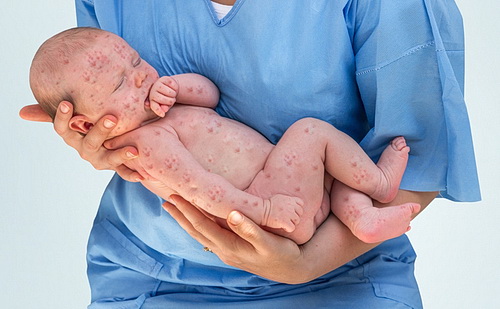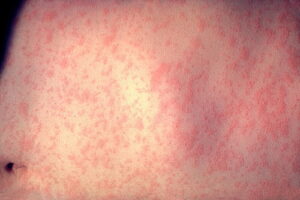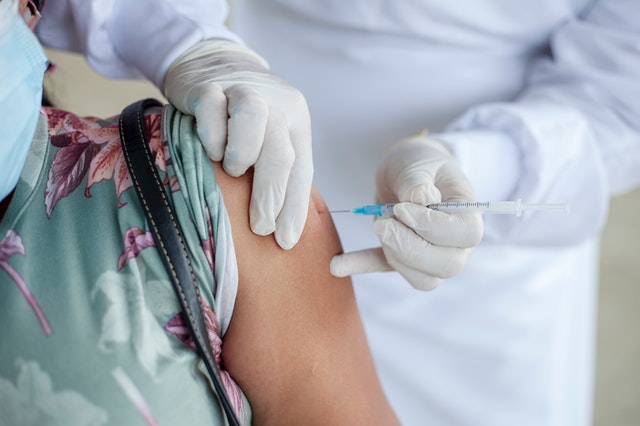
What is Measles?
Measles (MeV) is a highly contagious respiratory illness that typically spreads through droplets when an infected person coughs or sneezes. Measles primarily affects children, but it can occur in people of any age who haven’t been vaccinated or previously infected.
Symptoms

The symptoms of measles usually appear about 10 to 14 days after exposure and can include:
-
- High fever
- Cough
- Runny nose
- Red, watery eyes (conjunctivitis)
- Tiny white spots with bluish-white centers on a red background inside the mouth (Koplik’s spots)
- A red, blotchy rash that usually starts on the face and spreads to the rest of the body
On Its Way Back
Once considered nearly eradicated in the US and many developed countries, the disease has recently seen a surge in cases. This resurgence poses a significant public health threat, particularly to vulnerable populations like young children.
A Disease We Thought We Conquered

Before widespread vaccination campaigns were initiated, measles was a common illness mainly affecting children. In the United States alone, an estimated 3-4 million cases occur annually, resulting in hundreds of deaths. However, the introduction of the MMR (Measles, Mumps, Rubella) vaccine in 1963 dramatically changed the landscape of these diseases. By 2000, measles was declared eliminated in the US, meaning continuous transmission was no longer occurring.
Why Measles is Back
The resurgence of measles is attributed to several key factors:
-
- Decreased Vaccination Rates: Vaccine hesitancy, fueled by misinformation and mistrust in science, has led to declining vaccination rates in some communities. This creates pockets of susceptible individuals where the virus can quickly spread. The COVID-19 pandemic further exacerbated this issue, disrupting routine vaccinations and lowering overall vaccination rates.
- Global Travel: Measles is still prevalent in many parts of the world. Travelers infected with the virus can quickly bring it into countries with lower vaccination rates, sparking outbreaks.
- Waning Immunity: The effectiveness of the measles vaccine weakens over time. Booster shots are crucial for long-term protection, but some individuals may neglect getting them.
The Impact of the Resurgence
The return of measles is concerning for several reasons:
-
- Serious Complications: Measles is not a benign illness. It can lead to severe complications like pneumonia, encephalitis (brain swelling), and even death. These complications are dangerous for young children and those with compromised immune systems.
- Outbreaks: When vaccination rates fall below a critical threshold (around 95%), “herd immunity” (those areas where the diseases have been mostly eradicated) weakens. The virus can easily spread through a community, even infecting vaccinated people.
- Strain on Healthcare Systems: Measles outbreaks can significantly burden healthcare systems, requiring hospitalization for some patients and diverting resources from other critical medical needs.
The Importance of Vaccination

Many of us, especially if we live in New York State, probably don’t remember getting a measles vaccine when we were young, but rest assured we did! It is mandatory in New York State; however, that does not mean we won’t get it again. According to experts, the chances are unlikely that you will acquire it, but even if you do, your symptoms will be much milder than someone who wasn’t vaccinated. The best advice would be to talk to your doctor and see if you need a booster shot.
The good news is that measles is an entirely preventable disease through vaccination. The MMR vaccine is safe and highly effective, offering long-term protection against measles, mumps, and rubella.
Here’s what you can do:
-
- Get Vaccinated: Ensure you and your family are up-to-date on your MMR vaccinations. Consult your doctor if you have any questions or concerns.
- Educate Yourself: Seek reliable information about vaccine safety and effectiveness from reputable sources like the Centers for Disease Control and Prevention (CDC) or the World Health Organization (WHO).
- Advocate for Vaccination: Encourage others to get vaccinated and dispel myths or misinformation surrounding vaccines.
By working together to increase vaccination rates, we can prevent the spread of measles and protect ourselves and our communities from this potentially devastating disease.
